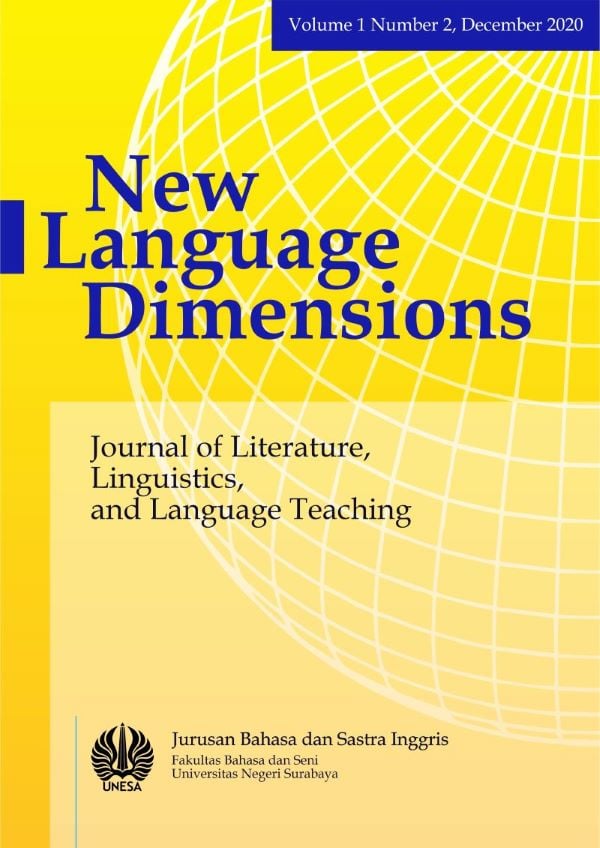Unraveling the Use of Quantity Maxim among EFL Learners on Online Classroom Interaction
DOI:
https://doi.org/10.26740/nld.v1n2.p55-64Abstract
This naturalistic qualitative study is intended to unravelling the working of quantity maxim introduced by Grice (1975) on EFL online classroom interaction amid the Covid-19 pandemic. Besides, this study is designed to investigate whether or not students violating or obeying the quantity maxim by observing and unravelling the utterances produced during online classroom interaction. Moreover, this study also provides factors that influence the non-observance maxim of quantity. The participant consists of 31 students from the fifth semester majoring in English Education at Tidar University. The study is conducted by recording, transcribing, and classifying the conversations done on online classroom interaction, viewed from Gricean maxim perspectives. The results reflect that students both observed and violated the maxim of quantity. The total number of observance maxim is 9, and 14 for the non-observance maxim. This study brings the conclusion that external factors such as unstable internet connection and interference coming from the surrounding environment during the online classroom can cause EFL students to break the maxim of quantity principle. Meanwhile, anxiety as an internal factor plays a crucial factor that leads the EFL students to violate the quantity maxim.
Downloads
References
Adebola, O. A. (2018). Cooperative Principle Maxims In Whatsapp Conversations Among Undergraduates In The Federal University Of Technology Akure, Ondo State, Nigeria. Advances in Social Sciences Research Journal, 5(10), 542557. https://doi.org/10.14738/assrj.510.5309
Betti, M. J., & Yaseen, K. S. (2020). The Iraqi EFL Learners Use of Conversational Maxims at the University Level. Education, Language and Sociology Research, 1(1), 4360. https://doi.org/10.22158/elsr.v1n1p43
Brown, H. D. (2007). Priciples of Language Learning and Teaching (Fifth Edit). Pearson Education, Inc.
Creswell, J. (2012). Educational Research. 4th Edition. Pearson Education, Inc.
Dwi E.S., A. (2015). An Analysis of Flouting Maxim in EFL Classroom Interaction. Journal Vision, 4(2), 243259.
Faridah, H. N. (2018). A Descriptive Analysis of Maxims of Cooperative Principle in the Teacher-Students Interaction in English Teaching and Learning Process in SMK Batik I Surakarta Academic Year 2017/2018.
Gay, L.R.; Mills, G., & E.; Airasian, P. w. (2011). Educational Research. PEARSON.
Grice, H. P. (1975). Logic and conversation. ACADEMIC PRESS, INC.
Hardianti, R. (2016). A study of efl students oral communication strategies in discussions. Indonesian EFL Journal, 2(1), 2333.
Hidayati, H., & Lukman, Lukman; Azmi, M. U. (2018). A Conversational Analysis of Grices Maxims Theories on Cooperative Principles at Undergraduate English Students. Journal of English Language Teaching and Linguistics (JELTL), 11(1), 5. https://doi.org/10.31764/leltj.v11i1.742
Horwitz, E. (2001). Language anxiety and achievement. Annual Review of Applied Linguistics, 21, 112126. https://doi.org/10.1017/s0267190501000071
Hutahaean, D. T. P. C. N. H. (2020). The Cooperative Principle in Conversation. Wiralodra English Journal (WEJ), 4(1), 8296. https://www.thoughtco.com/cooperative-principle-conversation-1689928
Koch, Susan, and Racy knell. (1991). The Effect ofthe Natural Approach on the Affective Filter. Prentice Hall, in press.
Linawati, D. (2013). A Gricean Maxim Analysis Of An English Teacher S Talks in SMP N 1 Kalasan ( A Case Study ). Universitas Yogyakarta.
Lindblom, K. (2001). Cooperating with Grice: A cross-disciplinary metaperspective on uses of Grices cooperative principle. Journal of Pragmatics, 33(10), 16011623. https://doi.org/10.1016/S0378- 2166(00)00069-2
Locastro, V. (2012). Pragmatics for Language Educators: A Sociolinguistic Perspective. Routledge Taylor & Francis Group. https://doi.org/10.4324/9780203850947
Nartiningrum, Novrika & Nugroho, A. (2020). Online Learning amidst Global Pandemic¯: EFL Students Challenges , Suggestions , and Needed Materials. ENGLISH FRANCA: Academic Journal of English Language and Education, 4(2), 115140.
Rohaniyah, J. (2013). Socio-Pragmatic Study¯; The Obscurity of Gricean Maxims ( Cooperative Principle Rules) [The Study of Flouted Maxims in Conversation through Gender Categories]. OKARA, 2, 114.
Safitri, Mega L; Seken, K., & Putra, A. J. N. (2014). Observance and Non-Observance of Gricean Maxims in Instructional Context¯: an Analysis of Efl Classroom Interaction. Jurnal Pendidikan Bahasa Inggris, 2(1).
Schiffrin, D. (1994). Approaches to Discourse. Blackwell Publishers. Taguchi,.
Sugiyono. (2012). Metode penelitian Kuantitatif, Kualitatif, dan Kombinasi (mixed methods). Penerbit Alfabeta. 14.
Sukriawati. (2019). A Gricean Maxim Analysis in EFL Classroom Interaction [Universitas Negeri Makassar]. http://eprints.unm.ac.id/15203/1/ARTICLE JOURNAL.pdf
Thomas, J. (1995). Meaning In Interaction; An Introduction to Pragmatics. Longman.
Widiasri, D. A., Budiarsa, M., Sudipa, N., & Satyawati, M. S. (2019). Cooperative Principle Implementation between Teachers and Students¯: Indonesian Language Teaching Case. International Journal of Social Sciences and Humanities, 3(2), 302308.
Yule, G. (1996). Pragmatics. Oxford University Press.
Yusro, A., Sutopo, D., & Yuliasri, I. (2020). The Application of Cooperative Principles in EFL Classroom Interaction¯: The Case of SMAN 4 Pekalongan. English Education Journal, 10(2), 124130.
Zhou, M. (2009). Cooperative Principle in Oral English Teaching. International Education Studies, 2(3), 4246.
Downloads
Additional Files
Published
Issue
Section
 Abstract views: 950
,
Abstract views: 950
, PDF Downloads: 615
,
PDF Downloads: 615
, PDF Downloads: 0
PDF Downloads: 0











